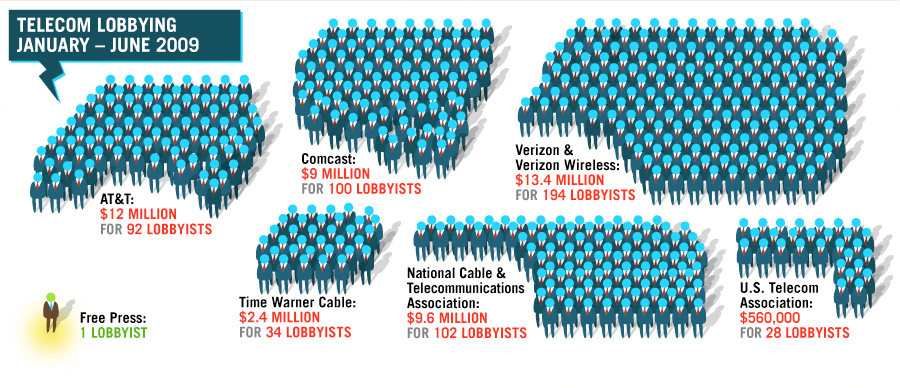Yesterday’s proposal by FCC Chairman Julius Genachowski gets Net Neutrality halfway there. That already puts us ahead of Canadian broadband, which is a throttler’s paradise, but remember — an eventual FCC rulemaking is not a law. An FCC policy is only as good as the agency’s willingness to enforce it. If a new administration decides Net Neutrality is not to their liking, they could very well appoint new Commissioners who agree, and while they may not repeal such policies, they aren’t likely to spend time enforcing them either.
Americans must insist that Net Neutrality have the force of federal law, and that can be done by telling your member of Congress to co-sponsor the Internet Freedom Preservation Act (H.R. 3458.)
Canadians need to immediately appeal to their MPs and ask why Canada is stuck with throttling broadband providers that completely ignore Net Neutrality when the United States not only has a bill to codify Net Neutrality protections but a regulatory communications body that is going to enforce it as policy even without a new law. That’s a far cry from the Canadian Radio-television Telecommunications Commission (CRTC) which has spent all year rubber-stamping the wish list of the broadband industry. That’s simply unacceptable, and Canadians need to tell MPs their vote in the next round of elections will depend on which candidate has the best plan to solve this mess. There is absolutely no justification for Canada falling behind the United States in broadband service. If the CRTC won’t represent Canadian citizens, perhaps it’s time to get rid of it and let them form an industry trade group, which isn’t far off from where they are right now.
Net Neutrality alone is not nirvana for broadband consumers. Indeed, there is every expectation some broadband providers may try to slap more Internet Overcharging schemes on consumers and try to blame Net Neutrality for it, under the false “either/or premise.” Too often, public interest groups and some consumers have been led astray with the assumption that one is better than the other, and that’s a false choice. Both are extremely bad for innovation, broadband advancement, and consumer adoption and acceptance of broadband service. When you engage in Overcharging schemes like raising prices, imposing usage caps, meters, overlimit fees and penalties, some consumers will decide it just isn’t worth it. Few consumers will risk using high bandwidth online applications of the future worried about their usage allowance for the month, or the penalty for exceeding it.
Internet Overcharging schemes are not dead, although some of the earlier experiments have been temporarily shelved. Some smaller providers in rural and small cities are already engaged in usage caps combined with consumption billing. AT&T continues its experiment in Beaumont and Reno. Comcast celebrated its first anniversary of the 250GB usage cap by leaving it right where it is, unchanged. Wireless mobile broadband is a 5GB capped experience all-around.
Although I realize it is difficult to generate intensity when there aren’t big bad actors imminently dropping Internet Overcharging on millions of broadband customers, this is not the time to keep the pressure off. Let’s make sure providers realize the intense, red hot hatred of gas gauges, meters, and all of the other Overcharging schemes has not cooled a single degree. You can do that by making another round of phone calls and sending messages to your member of Congress to support Rep. Eric Massa’s Broadband Internet Fairness Act (H.R. 2902.)
This bill does -not- get the government involved in regulating the pricing of broadband service, as some astroturfers have alleged. It simply demands proof that a provider has a financial need to engage in these practices, and in the absence of independent verification, protects consumers by prohibiting providers from leveraging their de facto monopoly/duopoly status and imposing them anyway.
No government legislation alone is ever going to solve all of our broadband problems and concerns. But some pro-consumer protections protect our wallets from the undercompetitive broadband industry most of us have to deal with.
Don’t be fooled by providers openly wondering why such protections are necessary. It was ironic watching yesterday’s panel discussion on broadband when David Young from Verizon started asking what problem Net Neutrality was trying to solve. He didn’t see any and had no problem living under the open platform standard Genachowski proposed. That’s ironic because Verizon has nearly 200 paid lobbyists fighting Net Neutrality and related telecommunications policy spending well over $10 million dollars on it this year. If Young doesn’t see the problem, why are ratepayers and shareholders footing the bill to address it?


 Subscribe
Subscribe




